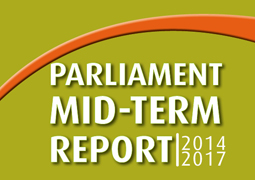
The Presiding Officers of Parliament presented a far-reaching overview of the Fifth Parliament’s Mid-Term Report to various stakeholders at Parliament today.
The presentation covered six board areas: Legislation and Law-making, National Budget, Public Participation, Financial Management and Provincial Act and International Engagement.
On the legislative front, the Speaker of the National Assembly, Ms Baleka Mbete, stated that the Fifth Parliament has passed 96 Bills, out of which only two were returned. “Most of these laws are guided by the priorities set out in the National Development Plan,” she said.
She admitted that based on their assessment, there was a need to strengthen and consolidate Parliament’s legal section so that Parliament could be in a position to initiate and pass laws. “We need an in-built capacity that will help us to initiate and pass laws. To achieve that we need to consolidate our legal section into a division.”
The Speaker also mentioned the imminent release of the highly anticipated report of the High Level Panel, which was charged with the task of assessing the impact of key pieces of legislation that were passed since 1994. And would form part of the legacy report that would be handed over to the sixth Parliament. “The release of this report is imminent, in fact, it will be presented before the end of this month. And is expected that its findings will inform the legacy report of the 6th Parliament.”
But high on Parliament’s agenda is a need to improve the capacity of Committees to conduct oversight over the executive, she said. She added that the oversight vigour displayed during the SABC inquiry and others that are currently ongoing are an inspiration. “We are proud of the oversight work done by Parliament and people have witnessed it first-hand. That is encouraging. But more needs to be done to strengthen the capacity of research and content advisors of Committees.”
Critical in Parliament’s work is public participation. That is a constitutional obligation we must not lose sight of, she said. “The Fifth Parliament has entrenched public participation in its law-making processes. Our Constitution states clearly that people must participate and be informed of the content and output thereof that inform our law-making processes.”
On international engagement, the Speaker expressed the urgency of establishing a Parliament of the Southern African Development Community (SADC), she said. “Four regions in Africa have their own regional Parliaments. It is only SADC that does not have a regional Parliament.”
Due to our bilateral and multilateral engagements we now know what we are not doing and ought to be doing, said the Chairperson of the National Council of Provinces, Ms Thandi Modise. “If we were doing what the Ugandan Parliament is doing, we would have a strong vetting mechanism to ensure that every Member of Parliament is in good standing.”
She also stated that Parliament was lagging behind in having a fully capacitated Parliamentary Budget Office (PBO). “Currently, the PBO is experiencing a strategic shortage of resources and that is the area we need to improve on.”
During the question session, the stakeholders posed a variety of questions – most of which dealt with the law-making processes of Parliament. A representative of the National Council of Trade Unions, (Nactu), Mr Malose Kutumela, asked whether there were any Bills passed that were deemed not feasible.
The Secretary General of Black Business Chamber, Mr Mntuwekhaya Cishe, asked whether Parliament has ever considered improving its public participation processes to ensure that it (Parliament) reaches grassroots communities.
The Deputy Speaker of the National Assembly, Mr Lechesa Tsenoli, responded: “People need to assess at what point can they have influence in law-making processes at Parliament. They must also be informed of the legislative cycles of Parliament and to deal with that strategically to ensure that they participate in this process fully and effectively.”
The Public Protector, Ms Busisiwe Mkhwabane, raised a concern about the disregard for communities’ inputs and the elevation of traditional authorities’ contribution in the formulation of traditional leaders’ Bills.
The Chairperson of the National Council of Provinces, Ms Thandi Modise, responded: “Traditional leaders have no final say in the formulation of Bills. We cannot shop out our responsibility to make laws. As Parliament we are committed to pass laws that represent the people.”
The Presiding Officers of Parliament promised that an engagement like this will be held in future as a mechanism to update its stakeholders about the progress and challenges that Parliament is faced with and how it intends to mitigate them.
By Abel Muting
14 Novembers 2017

